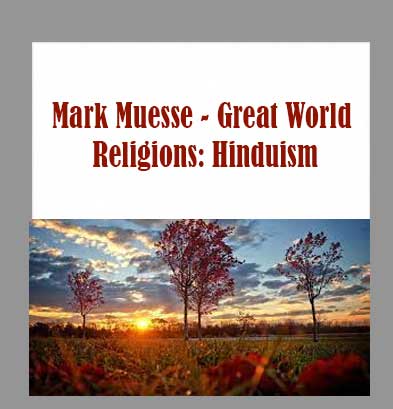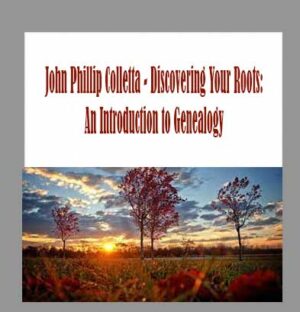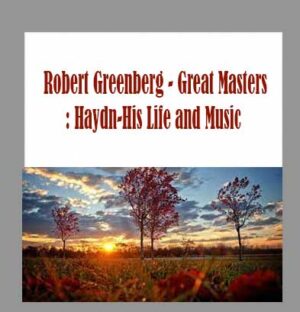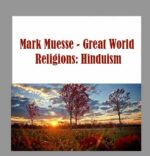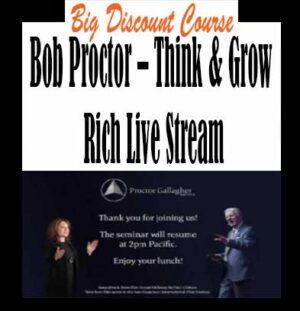Description
Mark Muesse – Great World Religions: Hinduism download, Mark Muesse – Great World Religions: Hinduism review, Mark Muesse – Great World Religions: Hinduism free
Mark Muesse – Great World Religions: Hinduism
Great World Religions: Hinduism
Get an overview of the history and practice of the oldest living religion in this concise and accurate course taught by an award-winning professor.
LECTURE (12)
01:Hinduism in the World and the World of Hinduism
Reflection on the subject and the methods used to examine it are very important when one begins the study of Hinduism, a very old and complex religion. This inaugural lecture describes how Hinduism will be studied in this series. We examine the words “Hinduism,†“religion,†and “India,†discussing why they are problematic yet useful for the study of our subject….
02:The Early Cultures of India
Hinduism is an amalgamation of elements from several cultural sources. This lecture focuses on two major contributors, the Indus Valley civilization, and the Aryans. The discovery of the Indus Valley civilization in the 19th century revealed a sophisticated and long-forgotten culture. In this lecture, we examine the artifacts left by this civilization and contemplate their import for its inhabitan…
03:The World of the Veda
In this lecture and the next, we explore the Aryan contributions to the emergence of Hinduism. Our guide is the rich collection of Aryan texts known as the Veda, today regarded by Hindus as their most sacred and authoritative scripture. We shall examine how these texts envisioned the world and its creation, some Vedic gods and goddesses, and the Veda’s understanding of the nature and destiny of hu…
04:From the Vedic Tradition to Classical Hinduism
This talk discusses the emergence of classical Hinduism and its views. We examine the place of ritual in Aryan life, their purposes, and their performers. In the central centuries of the first millennium B.C.E., remarkable changes raised doubts about the time-honored Vedic tradition. These doubts spurred the emergence of Hinduism. We see how philosophers came to see the human as an immortal soul e…
05:Caste
In addition to new ideas about life, classical Hinduism is defined by evolving social arrangements. This lecture and the next discuss the social foundations of Hinduism. We observe how Aryan society is transmuted into an exceedingly complex caste system. Rules regulating behavior within and between castes were developed and joined to the emerging ideas about the soul. These regulations had-and hav…
06:Men, Women, and the Stages of Life
Like caste, patterns of behavior became a fact of life during the emergence of classical Hinduism. We examine the roles of women and men and the social mores governing relationships. We see how regulations formed in classical Hinduism prescribed particular stages of life to be followed by men and women of caste. We give special attention to the householder stage, marriage, the patterns of family l…
07:The Way of Action
Classical Hinduism established the central problem of human existence for Hindus-samsara, the cycle of continual transmigration of the soul. Hinduism offers three ways to deal with this problem. This talk focuses on the first: the path of action, the most important religious discipline for most Hindus. The principal features of the path of action are performing meritorious religious deeds, includi…
08:The Way of Wisdom
Changes that precipitated classical Hinduism also caused transformation in Indian religious practices. Numerous movements rose in response to these developments. This lecture will discuss the sages who tried to continue the Vedic tradition by maintaining the authority of the Veda. These sages produced practices and philosophies to address transmigration and karma. We explore the new solutions from…
09:Seeing God
Early Western interpreters regarded Hinduism as a crude and hopelessly idolatrous religion. In this lecture we explore the dynamics of Hindu theism in theory and in practice. We see how the pantheon of Hinduism and devotion to images avoid idolatry, and we explore some of the rituals associated with worshiping the god(s). We focus on Siva, one of the most widely revered Hindu deities….
10:The Way of Devotion
Hinduism affirms the multiplicity of the divine as well as the multiplicity of paths to divine reality. In this lecture, we will look at the path of bhakti, or devotion. Oriented toward faith in a personal deity of choice, the path of devotion is a widely traversed road to god among Hindus. Our entry to bhakti practice will be through one of the most important and beloved of Hindu texts, the Bhaga…
11:The Goddess and Her Devotees
In this lecture, we study features of Goddess worship, a long-established tradition in India known as Saktism. We examine manifestations of the Goddess as consorts to the great gods and as autonomous devis. We learn that the feminine energy revealed by the Goddess is essential to Hindu theology. The lecture also explores the practices and concepts of Tantra, an esoteric yogic discipline with origi…
12:Hinduism in the Modern Period
Modern Hinduism has been challenged by Islam and Western culture. Both incursions into India have left profound and lasting imprints. In this lecture, we discuss Islam’s effects on Hinduism; we discuss how theological differences have formed tense relationships between Hindus and Muslims that frequently erupt into violence. We consider the effects of British expansion into India and religious resp…
DETAILS
Overview
Great World Religions: Hinduism provides you with an engaging window into the roots of a faith that is perhaps the most diverse of all, and which rejects the notion that there is one path to the divine. Over the course of Hinduism’s 5,000-year journey, you’ll explore the pantheon of Hindu gods and goddesses; the sacred writings in the Vedas, the Bhagavad-gita, and the Upanishads; the Aryan language of Sanskrit; and much more. As you move chronologically through Hinduism’s history&;amp;-from its earliest precursors to its classical manifestations to its responses to the modern era&;amp;-you continually place salient aspects of Hindu life and worship in historical and theological framework. The result is an engaging and comprehensive look at the world’s oldest living religious tradition.
About
Mark W. Muesse
“Mindfulness allows us to become keen observers of ourselves and gradually transform the way our minds operate.â€
ALMA MATERÂ Harvard University
INSTITUTIONÂ Rhodes College
Dr. Mark W. Muesse is W. J. Millard Professor of Religious Studies, Director of the Asian Studies Program, and Director of the Life: Then and Now Program at Rhodes College in Memphis, Tennessee. He earned a B.A., summa cum laude, in English Literature from Baylor University and a Master of Theological Studies, a Master of Arts, and a Ph.D. in the Study of Religion from Harvard University. Before taking his position at Rhodes, Professor Muesse held positions at Harvard College, Harvard Divinity School, and the University of Southern Maine, where he served as Associate Dean of the College of Arts and Sciences. He is a recipient of the 2008 Clarence Day Award for Outstanding Teaching, Rhodes College’s highest faculty honor. Known for his experiential teaching style, Professor Muesse was honored for his effective use of imaginative and creative pedagogy as well as his ability to motivate his students toward lifelong study. Professor Muesse has written many articles, papers, and reviews in world religions, spirituality, theology, and gender studies and has coedited a collection of essays titled Redeeming Men: Religion and Masculinities. He is currently compiling an anthology of prayers from around the world. Professor Muesse is a member of the American Academy of Religion and the Society for Indian Philosophy and Religion and has been Visiting Professor at the Tamilnadu Theological Seminary in Madurai, India. He has traveled extensively throughout Asia and has studied at Wat Mahadhatu, Bangkok, Thailand; the Himalayan Yogic Institute, Kathmandu, Nepal; the Subodhi Institute of Integral Education, Sri Lanka; and Middle East Technical University, Ankara, Turkey.

